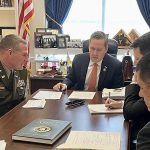There’s a certain irony in the fact that alarm bells are ringing over classified information regarding U.S. military activities. For any rational person, the idea that intelligence about an impending attack should be locked away tighter than a drum should be as obvious as a red state in the electoral map. However, this principle seems to elude some folks in positions of power, who may not grasp that when the stakes are global security, keeping secrets secret is not just a choice, but a necessity.
The left frequently touts transparency in government, and yet they often have a peculiar way of defining it when national security is in question. When there’s credible information that indicates an attack may be forthcoming, haphazardly leaking that information or treating it casually is a recipe for disaster. It not only jeopardizes U.S. interests but also places the lives of allied forces at risk. In what world is it acceptable to let potential adversaries know what strategies the U.S. might be employing? Perhaps in a world dominated by those who haven’t served a single day in the military, where the only battle they face is for the last piece of avocado toast.
It’s also worth pondering who gets to decide what constitutes “top secret” in this brave new world of information sharing. Those in Washington deeming anything potentially embarrassing to their agenda as “top secret” while playing fast and loose with genuine national security intel should raise some eyebrows. Talk about a mixed bag of priorities – they want you to trust them with your tax dollars and domestic policy but leave you in the dark about real threats and military operations. Sounds like a one-sided deal, doesn’t it?
Trump team can’t argue these messages weren’t classified — of course they were! https://t.co/NQUCZ2KqaB pic.twitter.com/gwMXpwKJte
— NY Post Opinion (@NYPostOpinion) March 26, 2025
The implications of this kind of muddled thinking go beyond mere bureaucratic incompetence. The message is clear: if the U.S. doesn’t take its own protective measures seriously, why should anyone else? Allies are left wondering if they can rely on American intelligence while foes are likely laughing in the shadows, knowing that our secrets might as well be broadcast on the evening news. Such casual handling of classified information ultimately weakens national resolve, and the last thing this country needs is a leadership that prioritizes optics over reality.
In a post-9/11 world, it is essential to learn from past mistakes rather than repeat them. It should not be controversial to argue that protecting information about military operations is fundamental. Rather than opening Pandora’s box, the U.S. must close ranks, ensuring that national security is prioritized over political posturing. For conservatives, the last thing anyone wants to see is a repeat of poor decision-making leading to national vulnerabilities; lessons must be learned, and classified information should remain just that – classified.




